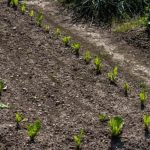A professional vegetable gardener is an individual who specializes in the cultivation of vegetables for commercial or professional purposes. These experts play a crucial role in ensuring the availability of fresh, healthy produce for consumers while also contributing to sustainable agriculture practices.
Professional vegetable gardeners possess a unique set of qualifications and skills that enable them to thrive in their field. From knowledge of soil composition and plant biology to proficiency in pest management and crop rotation, these individuals are well-equipped to maximize yields and maintain the health of their crops.
In addition to technical expertise, professional vegetable gardeners must also have a keen understanding of business practices and market trends. They are responsible for setting up efficient and productive vegetable gardens, implementing best practices for maintenance, and overcoming common challenges such as weather fluctuations or pest infestations. Their dedication and commitment to their craft are essential in ensuring the success of their operations.
Qualifications and Skills Needed to Become a Professional Vegetable Gardener
Becoming a professional vegetable gardener requires more than just a green thumb. It is essential to possess certain qualifications and skills to thrive in this career path. Below are the key qualifications and skills needed to become a successful professional vegetable gardener:
- Education: While a formal degree is not always necessary, taking courses related to horticulture, botany, or agricultural science can provide valuable knowledge and skills.
- Experience: Hands-on experience in gardening, especially with vegetables, is crucial. This can be gained through working in community gardens, internships, or even starting your own vegetable garden at home.
- Knowledge of plants: Understanding the different types of vegetables, their specific requirements, and common diseases that affect them is essential for successful vegetable gardening.
- Attention to detail: Being meticulous and observant are important traits as a professional vegetable gardener needs to closely monitor the health and growth of their plants.
- Physical stamina: Vegetable gardening can be physically demanding, so being in good physical shape is important for tasks such as digging, planting, weeding, and harvesting.
In addition to these qualifications and skills, communication skills are also crucial for professional vegetable gardeners. They may need to work with clients or colleagues, teach workshops or classes on gardening techniques, or even create educational materials for the public. Being able to effectively communicate ideas and information about vegetable gardening is key to success in this field.
Overall, becoming a professional vegetable gardener requires a combination of education, experience, knowledge of plants, attention to detail, physical stamina, and strong communication skills. By honing these qualifications and skills over time, individuals can establish themselves as reputable professionals in the field of vegetable gardening.
Setting Up a Vegetable Garden for Professional Purposes
Choosing the Right Location
One of the key factors in setting up a vegetable garden for professional purposes is selecting the right location. Professional vegetable gardeners understand the importance of choosing a spot that receives an adequate amount of sunlight throughout the day. This is crucial for the proper growth and development of vegetables. Additionally, it is important to consider factors such as water availability, drainage, and proximity to resources like compost bins or storage areas.
Selecting the Vegetables
Professional vegetable gardeners carefully select the types of vegetables they want to grow based on factors such as market demand, climate suitability, and personal preference. It is essential to choose a variety of vegetables that will thrive in the chosen location and provide a diverse range of produce throughout the growing season. Consideration should also be given to crop rotation to maintain soil health and prevent disease buildup.
Designing the Layout
Creating an efficient layout for a professional vegetable garden is crucial for maximizing productivity and ease of maintenance. Professional vegetable gardeners often opt for raised beds or rows with ample space between plants for air circulation and weed control. Utilizing techniques such as companion planting can also help improve yields and reduce pest problems naturally. Proper planning and organization are essential in ensuring a successful and productive vegetable garden for professional purposes.
By carefully considering location, vegetable selection, and layout design, professional vegetable gardeners can create a thriving garden that provides bountiful harvests year after year. Their dedication to providing high-quality produce while implementing sustainable practices sets them apart in the world of gardening professionals.
Best Practices for Maintaining a Vegetable Garden Professionally
Maintaining a vegetable garden professionally requires dedication, knowledge, and skills to ensure a successful harvest. Professional vegetable gardeners follow best practices to optimize plant growth, prevent disease, and maximize yield. Here are some key practices that every professional vegetable gardener should incorporate into their routine:
Regular Soil Testing and Amendment
One of the fundamental aspects of maintaining a healthy vegetable garden is ensuring that the soil is rich in essential nutrients. Professional vegetable gardeners regularly conduct soil tests to determine the pH level and nutrient content of the soil. Based on the results, they amend the soil with organic matter such as compost, manure, or fertilizers to provide plants with the necessary nutrients for optimal growth.
Proper Irrigation
Watering plays a crucial role in maintaining a vegetable garden professionally. Over-watering can lead to root rot and other diseases, while under-watering can stunt plant growth and reduce yield. Professional vegetable gardeners use drip irrigation systems or soaker hoses to deliver water directly to the plants’ roots while minimizing water waste. They also monitor soil moisture levels regularly and adjust watering schedules based on weather conditions.
Weed Control and Pest Management
Weeds compete with vegetables for nutrients and water, making it essential for professional vegetable gardeners to practice proper weed control. Mulching around plants can help suppress weed growth while retaining soil moisture. Additionally, integrated pest management techniques such as using beneficial insects, companion planting, and row covers are employed to keep pests at bay without relying on harmful chemicals. By staying proactive in weed control and pest management, professional vegetable gardeners can ensure healthy plant growth and bountiful harvests.
By following these best practices for maintaining a vegetable garden professionally, aspiring professional vegetable gardeners can set themselves up for success in this rewarding field. A combination of knowledge, hands-on experience, and dedication is key to achieving thriving crops and sustainable gardening practices.
Tools and Equipment Required for Professional Vegetable Gardening
Professional vegetable gardening requires a specific set of tools and equipment to ensure that the garden is well-maintained and productive. One essential tool for a professional vegetable gardener is a high-quality irrigation system. Proper watering is crucial for the health and growth of vegetables, and an efficient irrigation system can help save time and ensure consistent moisture levels in the soil.
Another important piece of equipment is a set of quality hand tools, such as spades, shovels, hoes, and pruners. These tools are essential for tasks like digging, weeding, and pruning that are necessary for maintaining a healthy garden. Investing in durable, ergonomic hand tools can make the work easier and more effective for professional vegetable gardeners.
In addition to hand tools, professional vegetable gardeners often rely on power tools such as tillers or cultivators for larger-scale projects like preparing soil for planting or breaking up compacted soil. These machines can help speed up the gardening process and reduce physical strain on the gardener. However, it’s important to choose the right size and type of power tool for the specific needs of the garden to avoid causing damage to plants or soil.
| Tools & Equipment | Importance |
|---|---|
| Irrigation System | Ensures consistent moisture levels in the soil |
| Hand Tools (spades, shovels, hoes, pruners) | Necessary for tasks like digging, weeding, and pruning |
| Power Tools (tillers, cultivators) | Speeds up gardening process; reduces physical strain |
Dealing With Common Challenges Faced by Professional Vegetable Gardeners
One of the major challenges that professional vegetable gardeners often face is pest control. Pests such as aphids, caterpillars, and beetles can wreak havoc on a vegetable garden if not properly managed.
To address this challenge, professional vegetable gardeners can implement integrated pest management strategies that involve techniques such as companion planting, using beneficial insects, and applying organic pesticides sparingly. It is essential for professional vegetable gardeners to stay vigilant and regularly monitor their crops to catch any pest infestations early.
Another common challenge for professional vegetable gardeners is managing soil health. Over time, the soil in a vegetable garden can become depleted of essential nutrients, leading to poor crop growth and yield. To combat this challenge, professional vegetable gardeners should regularly test their soil and amend it with organic matter such as compost or mulch. Crop rotation can also help maintain soil fertility by preventing the buildup of pests and diseases associated with specific crops.
Weather conditions can also pose challenges for professional vegetable gardeners. Extreme temperatures, droughts, heavy rains, or unexpected frosts can all impact the success of a vegetable garden. Professional vegetable gardeners must be prepared to protect their crops from adverse weather conditions by using methods such as row covers, shade cloth, or cold frames. Additionally, selecting appropriate plant varieties suited to the local climate can help mitigate potential weather-related challenges.
| Challenges Faced | Solutions |
|---|---|
| Pest Control | Integrated Pest Management strategies |
| Soil Health | Regular soil testing and amending with organic matter |
| Weather Conditions | Protective measures like row covers and selecting climate-appropriate plant varieties |
Success Stories From Professional Vegetable Gardeners
Professional vegetable gardening can be a rewarding and fulfilling career choice for those with a passion for growing fresh produce. Many individuals have found success in this field by utilizing their skills and knowledge to create bountiful and sustainable gardens. Here are some inspiring success stories from professional vegetable gardeners:
- Susan Smith: Susan Smith started her career as a professional vegetable gardener after completing a certification program in horticulture. She began by setting up a small vegetable garden in her backyard and eventually expanded to supply fresh produce to local restaurants and farmers markets. Through dedication and hard work, Susan has established herself as a respected figure in the local farming community.
- John Doe: John Doe always had a green thumb and decided to turn his passion for gardening into a profession. With years of experience working on various farms, John gained the skills needed to start his own vegetable garden business. Today, John’s farm has become known for its high-quality organic vegetables, attracting customers who appreciate locally grown produce.
- Maria Garcia: Maria Garcia faced many challenges when she first started her professional vegetable gardening business, from unpredictable weather patterns to pest infestations. However, through perseverance and innovative problem-solving, Maria was able to overcome these obstacles and create a thriving garden that now serves as an educational resource for aspiring gardeners in her community.
These success stories highlight the potential for growth and success in the field of professional vegetable gardening. By honing their skills, staying committed to sustainable practices, and adapting to changing circumstances, these professionals have been able to make a significant impact on their communities while pursuing their passion for cultivating fresh, nutritious produce.
Tips for Aspiring Professional Vegetable Gardeners
Becoming a professional vegetable gardener requires dedication, hard work, and a passion for growing fresh produce. If you’re an aspiring professional vegetable gardener, here are some tips to help you achieve success in this rewarding field:
First and foremost, it’s essential to educate yourself about different vegetables, their growing requirements, and best practices for cultivating them. Consider taking courses or workshops on gardening, attending seminars, or reading books written by experienced professional vegetable gardeners. This knowledge will provide you with a strong foundation to start your career in vegetable gardening.
Networking is also crucial for aspiring professional vegetable gardeners. Connect with established professionals in the industry, join gardening clubs or associations, and attend trade shows or events related to vegetable gardening. Building a network of like-minded individuals can provide you with valuable advice, support, and potential job opportunities in the future.
Another key tip for aspiring professional vegetable gardeners is to gain hands-on experience through internships or apprenticeships with established gardening companies or farms. This practical experience will not only enhance your skills but also give you insight into the day-to-day operations of a successful vegetable garden. Additionally, consider starting small by growing your own vegetables at home or volunteering at community gardens to further hone your techniques as a professional vegetable gardener.
Conclusion
Professional vegetable gardening is not only a rewarding career but also plays a crucial role in promoting sustainable practices and combating food insecurity. As the demand for organic, locally-grown produce continues to rise, the need for skilled professional vegetable gardeners becomes increasingly important. These individuals possess a unique blend of horticultural knowledge, practical skills, and dedication to maintaining productive gardens that benefit both consumers and the environment.
In order to thrive as a professional vegetable gardener, one must have a deep understanding of plant biology, soil health, pest management, and crop rotation techniques. Additionally, strong communication skills are essential when working with clients or selling produce at farmers’ markets. By continually honing their craft and staying updated on the latest trends and technologies in the industry, professional vegetable gardeners can ensure the success of their operations while minimizing negative impacts on the environment.
As we look towards the future of professional vegetable gardening, it is evident that these individuals will play a crucial role in promoting sustainable agriculture practices and reducing our carbon footprint. By growing food locally and organically, professional vegetable gardeners help reduce transportation emissions associated with importing produce from faraway locations. Furthermore, by implementing eco-friendly gardening techniques such as composting, rainwater harvesting, and natural pest control methods, they contribute to preserving biodiversity and enhancing soil fertility for future generations.
In conclusion, aspiring professional vegetable gardeners should be encouraged to pursue their passion for cultivating nutritious produce while prioritizing environmental stewardship. By embracing best practices in sustainable agriculture and sharing their knowledge with others in their communities, these individuals can make a significant impact on food security and ecological sustainability. The future of professional vegetable gardening holds great promise for fostering healthier ecosystems and promoting a closer connection between people and the food they eat.
Frequently Asked Questions
What Is a Professional Gardener Called?
A professional gardener is typically called a landscaper or horticulturist. These individuals are skilled in designing, planting, and maintaining gardens to ensure they thrive and look visually appealing.
Can You Make Money With a Vegetable Garden?
It is possible to make money with a vegetable garden by selling the produce you grow. Many people establish small-scale market gardens and sell their vegetables at farmers’ markets, through CSA programs, or directly to restaurants.
How Do I Hire a Local Gardener?
Hiring a local gardener can be done by asking for recommendations from neighbors, friends, or local gardening centers. You can also search online for gardening services in your area and read reviews from previous clients to ensure you find a reliable gardener who meets your specific needs.

If you’re looking to get into vegetable gardening, or are just looking for some tips on how to make your current garden better, then you’ve come to the right place! My name is Ethel and I have been gardening for years. In this blog, I’m going to share with you some of my best tips on how to create a successful vegetable garden.





